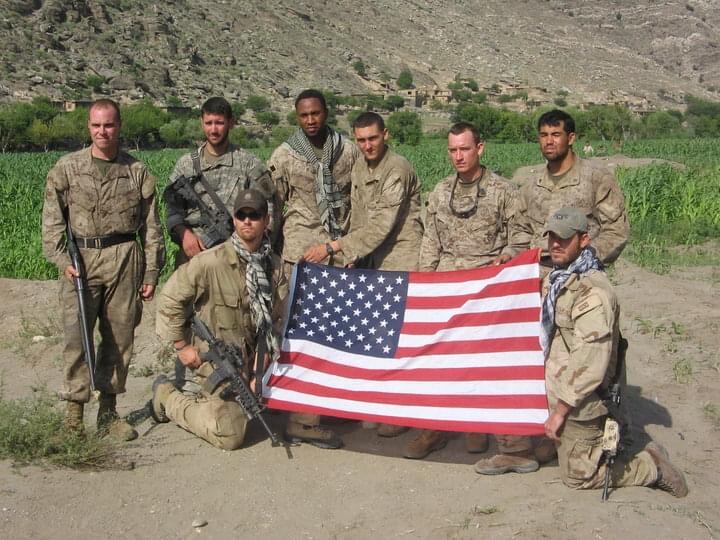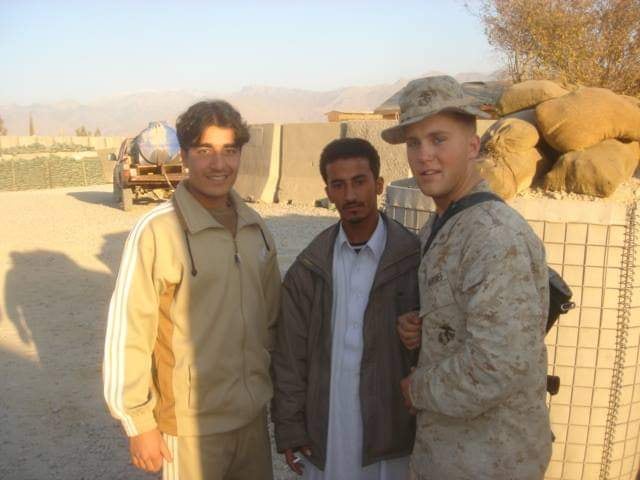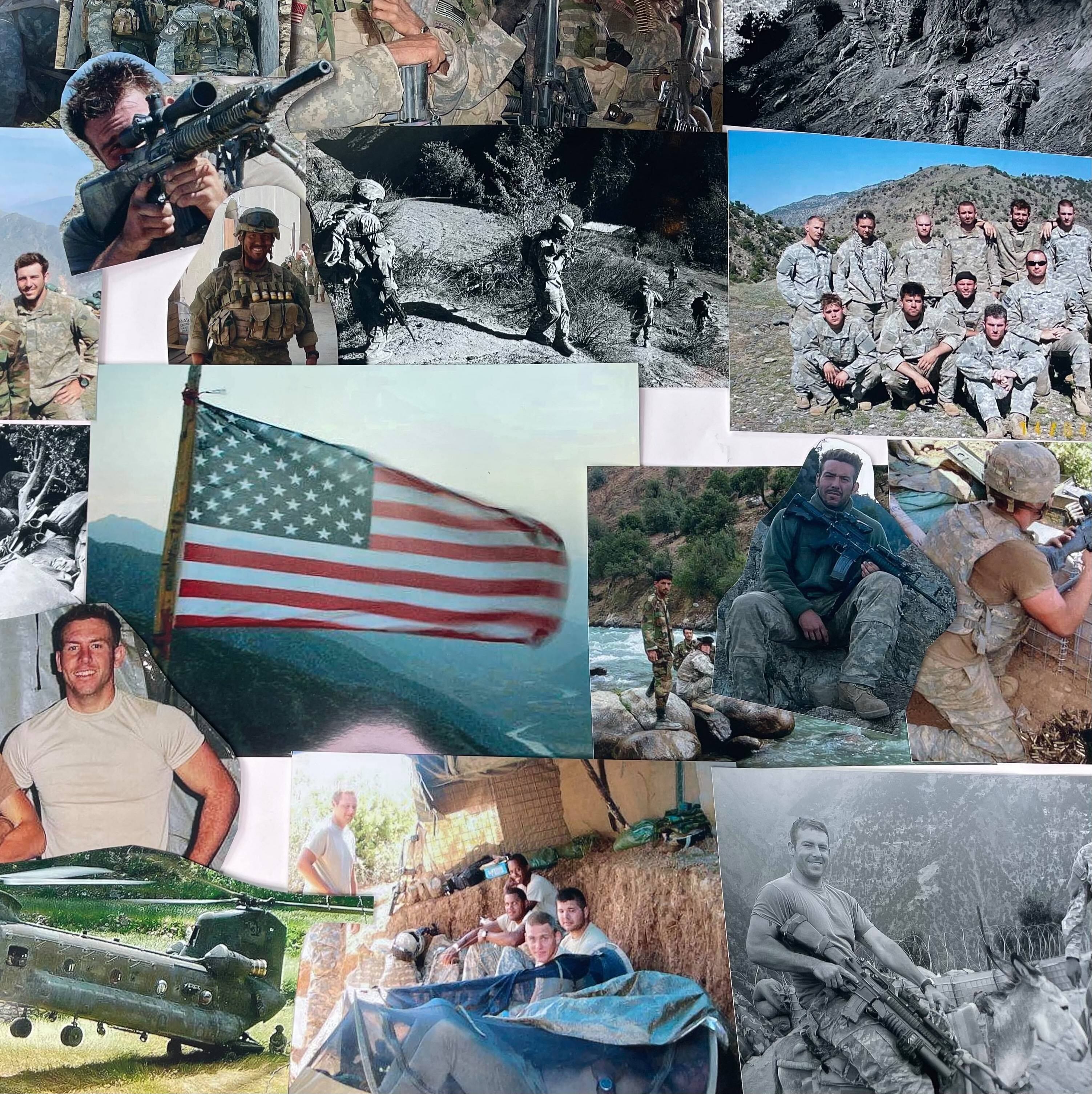Shaun Duling and Festus McDonough enlisted in the Marine Corps in 2003 after graduating high school.
The two radio operators, the former from the Washington, D.C. area and the latter from Massachusetts, met by way of an assignment to the Hawaii-based 2nd Battalion, 3rd Marines, a unit that would shepherd them on a 2005 deployment to Afghanistan’s Kunar Province. Army veteran R.J. Blake soon followed suit, deploying from 2006 to 2007 to the same region as a member of the famed 10th Mountain Division.
Like many young service members navigating the early post-9/11 landscape, each clung to a semblance of belief in the mission, of unshakable optimism and what seemed a certainty of exacting revenge.
“I just felt we were over there fighting an enemy who attacked America and liberating the people of Afghanistan from Taliban rule,” Duling told me Tuesday.
Arriving in 2006 with much of the same hubris-fueled perceptions of an enemy now all-too familiar, Blake admitted anticipating “a cakewalk with no action.”
“We thought it was going to be easy to win hearts and minds.”
Failure
Afghanistan’s collapse in recent weeks signaled a seemingly overnight reversal of democratic policies and institutions instilled over the last two decades. Few predicted the speed in which the Taliban would route the Afghan army — or that the militia would roll through many of the nation’s provinces without a single shot fired in retaliation.
U.S. Senate Republican Leader Sen. Mitch McConnell, R-Ky., called the scene “a shameful failure of American leadership,” a statement echoed by Rep. Seth Moulton, D-Mass., a Marine veteran who characterized the process as a “moral and operational failure.”
But outside of Washington, the events are forcing an estimated 2.8 million service members who have deployed at least once to war operations in Afghanistan or Iraq since 2001 to consider whether their service meant anything at all.
Twenty years is ample time to transition from battle-hungry youth to furious and, eventually, disillusioned veteran, a process that culminated in my own life years ago while watching helplessly as black ISIS flags were unfurled over hard-fought battlegrounds in Iraq, a country where I was deployed all of 2006 and parts of 2007 as a Marine scout observer.
My own experience prompted me to reach out to Duling, McDonough and Blake to discuss the evolution of their perceptions of Afghanistan. What did they think about the tumultuous images emerging from Kabul, where thousands of civilians at Hamid Karzai International Airport continue a desperate attempt to flee from Taliban control? Could they still find value in their experiences? How were their hearts and minds?
A hornet’s nest

Soon after touching down in 2005 in Afghanistan’s Kunar Province, Duling and McDonough found themselves stepping off as participants in well-known operations bearing names like Red Wings and Whalers.
Blake’s 2006-2007 brigade reconnaissance, meanwhile, landed him in combat-riddled valleys such as Korengal, Narang and Kamdesh, where the 10th Mountain Division “stirred up a hornet’s nest of a capable, resilient enemy,” he said. “Nothing about it was a cake walk.”
Nearly every day yielded intense action for Blake and the small reconnaissance teams from 10th Mountain, who faced innumerable clashes with Taliban forces of 50 to 80 that oftentimes came down to “holding a line from being overrun with only half that manpower,” he said.
In May 2006, the division was in the midst of Operation Mountain Lion when one of their CH-47 Chinook helicopters went down over the Kunar Province, killing 10 soldiers, including Lt. Col. Joseph Fenty, who, at the time, was the highest-ranking KIA of the conflict. That fall, Blake was manning Combat Outpost Kamdesh when Lt. Benjamin Keating was killed. The stronghold would later be renamed COP Keating, a location documented in the book — and movie of the same name — “The Outpost,” which chronicled the harrowing Battle of Kamdesh in 2009.
Intermittent excursions to meet with locals terrified of living under the Taliban’s barbarism reaffirmed early-held beliefs in expelling evil from Afghanistan. This became especially true after witnessing firsthand the militia’s “enslavement of kids for sex, and cutting off noses or ears of those who dared to work with Americans,” Blake said.
But as the months wore on, unrelenting firefights, mounting casualties and increasingly blurred lines began to wear on the war’s participants. Over time they began to curse the landscape they once admired and the soaring mountains they were forced to hump.
“It was such a complex war with more than one enemy, not just the Taliban,” Blake said. “Sometimes it seemed like it was just some young, bored kids shooting at us.”
“Hearts and minds sounded great on paper, but it was often seen as an empty promise to the locals,” McDonough said. “We would inevitably break those promises in one of two ways. First, the command may just up and move us to a different area, leaving those who helped us high and dry. Second, frequent deployment rotations meant personal relationships would only last, at most, a few months to a year.”
Months into patrolling the Kunar Province, McDonough experienced firsthand the ramifications of relationships that too often teetered on the edge of a knife. An ally one day could be an enemy the next, he said, defecting if the money was right.
“Several told us before leaving that it was nothing personal,” he said. “These are guys who lived on our [forward operating base] and knew every square inch of it. One day I was in a vehicle that was hit with an IED less than 100 yards from an Afghan National Police-manned checkpoint. They knew it was there. They were supposedly on our team and let us drive right at it.”
For Blake, Duling and McDonough, deployments that teased once-naive prospects would eventually come to an unceremonious end. Arriving units took the place of the outgoing, each comprising young men and women who would undergo a similar transformation. The Forever War continued to ebb and flow over the ensuing years more than the undulating valleys in which it was fought.

Like their deployments, enlistments also drew to an end, ushering them into a world shockingly disconnected from their own. Hard-drawn lines of good versus evil and revenge became vague, replaced instead by decades of confusion and anger as images of returning bodies of American service members continued flowing during one administration after another.
“Seeing politicians use Afghanistan and Iraq as a talking points without any action, then seeing young men and women run through deployment after deployment until they have nothing left to give, only to be discarded and left to figure out how to cope...” Duling paused. “Processing all that is when I started to feel we have been lied to.”
Was it worth it?
The images emerging over the past week are staggering. One authenticated clip showed civilians in Kabul rushing an Air Force C-17 Globemaster in last-ditch effort to evade Taliban-imposed law. As the titanic plane ascended, multiple Afghans plummeted from the sky to their deaths, a vision that will likely be seared into the records of policy-makers who oversaw 20 years of decisions that will be questioned long after.
Those who carried out missions on the ground, however, are faced with juxtaposing the imagery of Afghanistan reaching its nadir with their own memories, of patrolling, of handing out treats to children, and of eating, drinking and laughing with locals who have spent their entire lives in fear of an enemy now in power.
“The locals were so appreciative of us there — this feels like we turned our backs on them,” Blake told me. “I’m just angry and sad. I love the Afghan people. Very hospitable. I loved their spirit and way of life.”

“I can’t imagine being a family member of any of the service members who were killed in Afghanistan,” McDonough added. “It just shows such a total lack of planning in assisting those who helped us so much over the years.”
In a message to the fleet Wednesday, Marine Corps Commandant Gen. David Berger and Sergeant Major of the Marine Corps Troy Black addressed the existential bewilderment rippling throughout the veteran community, assuring Marines past and present that “You fought for the Marine to your left and the Marine to your right. You never let them down.”
The message is similar to one that Duling, now 36, expressed to me from his office at Washington Gas, where he’s taken charge in recent years as a leader of the D.C.-area company’s veteran initiatives.
“The Marine Corps fundamentally changed the way I viewed the world, exposed me to incredible leaders, and even better friends,” Duling said. “I’m still very proud to be a Marine, and I know we did a lot of good during those 20 years. Despite seeing the current state of that beautiful country, I have to hold on to the belief that we gave them hope.”
After answering my questions, Duling and McDonough exchanged a few messages on Instagram. In a couple months, they will be rendezvousing in Austin, Texas, alongside a few other Marines who deployed with them, an annual reunion they kicked off a few years ago to make sure they remain a part of one another’s lives.
This year there will inevitably be more to discuss, more questions floated.
Was it worth it?
“Yes,” Berger wrote Wednesday. “Does it still hurt? Yes.”
J.D. Simkins is the executive editor of Military Times and Defense News, and a Marine Corps veteran of the Iraq War.





